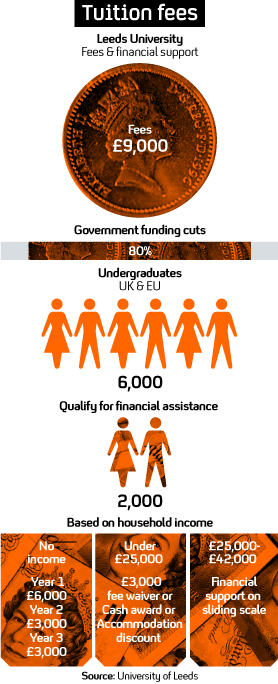Tuition fees: will the system improve access?
Will more students from lower-income backgrounds be able to attend top universities under the new funding plans, despite maximum fees of £9,000? Channel 4 News checks it out.

Up to 75 per cent of universities are planning to charge the maximum £9,000 tuition fee from next year, after the Government changed the rules on how higher education should be funded.
In response to cuts in central Government funding, many universities say they have no choice but to charge the upper limit – while others, including Vice-Chancellor Professor Peter Graham of Teeside University (which will charge £8,500), say they have to charge the full fee so that their students do not feel “second rate”.
Fair access
While £9,000 a year sounds like a daunting initial outlay, students will not pay upfront. Instead, they will get a loan from the Government which they will have to pay back when they are earning, as graduates.
This is one way in which the system will help people from lower-income backgrounds, the Government says – but it insists there are other improvements in the new system as well.
A spokesman from the Department for Business, Innovation and Skills told Channel 4 News: “Each university will need to show how they meet tough new conditions in an approved access agreement from the Director for Fair Access, if it wants to charge more than £6,000.
“Some universities have said they would like to charge £9,000 for some of their students but they have also proposed extensive fee waivers, while others have said they will charge significantly lower amounts. This means many students will pay less than the published price, and will subsequently borrow less.”
Who is charging what? Find out on the Channel 4 News tuition fees map
But will this actually work out? As universities submit their final proposals, Channel 4 News looks at one university’s plans.
Leeds
The University of Leeds is one of many universities planning to charge a maximum of £9,000 a year tuition fees. As a member of the Russell Group, it is one of the UK’s top 20 leading universities, and its vice-chancellor says it has to charge the full fee to maintain its educational excellence while struggling with 80 per cent Government funding cuts.
However, it is also introducing a “generous” package of support measures which it says will see one in three UK and EU undergraduates eligible for some kind of financial help.
Vice-Chancellor Professor Michael Arthur said: “No student should believe that a degree at a prestigious university like Leeds is beyond their grasp. We think the package of support we are making available for students is generous, innovative and tailored to their needs.”
The university says that students with a household income of less than £25,000 will be able to choose between a £3,000 fee waiver, cash award or accommodation discount, “meaning they can access financial assistance in the form best-suited to their needs.”
For students from households with income of between £25,000 and £42,000, there will be financial support on a sliding scale.
And for households with no income, students will be entitled for £6,000 in their first year, and £3,000 in their second and third years.
OFFA will now decide whether this plan is comprehensive enough – and the University of Leeds, along with many other institutions, will have to wait and see what impact the changes have on its student population over the next few years.
-
Latest news
-
Mark Menzies: is UK politics full of scandal?33m

-
Windrush scandal: returning to the UK after a forty year wait6m

-
Netanyahu ‘survival’ depends on ‘expanding war’ says head of Palestinian National Initiative5m

-
Proposed law change could strip parental rights from paedophiles5m

-
Hugh Grant settles privacy lawsuit against The Sun newspaper publisher2m

-




